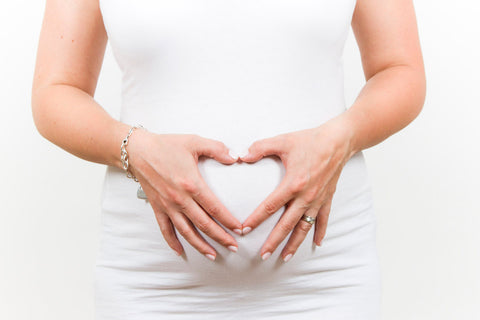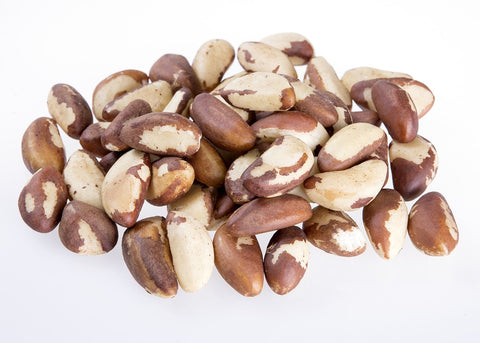Healthy lifestyle and diet are always very important aspects of life at any time, but they are even more important for women who are planning a pregnancy or are already pregnant.
Of course, it is always best to get all vitamins, minerals and other nutrients from the food. The problem, however, is that at the present time it is very difficult to get sufficient amounts of all the nutrients from food alone.
Due to the soil depletion, poor dietary habits, stress, and other factors, deficiency of vitamins and minerals is a very common problem. In addition, during pregnancy the demands of a growing foetus can worsen these deficiencies or even cause them, putting unborn babies at risk for developmental issues and birth defects.
The same deficiencies make pregnant and breastfeeding women tired and contribute to low mood, hormonal imbalance, morning sickness and other problems.
Most Important Nutrients Needed Before, During And After Pregnancy
- Vitamin B12 deficiency is a very common problem today not only among vegans or elderly people but also among those who consume animal foods (meat products and dairy) due to the fact that caged and treated with antibiotics animals are deficient in B12 producing bacteria. B12 deficiency may be even more common among pregnant women and it is very dangerous for both foetus development (may lead to neural tube damage in foetus) and pregnant woman (neurological damage, fatigue, etc.). B12 must be in the form of sublingual methylcobalamin and not cyanocobalamin: 1000 to 2000mcg under the tongue only after breakfast every day before and during pregnancy. B12 should be taken with folic acid (L-methylfolate is the best form). Vitamin B12 is also the best way to boost energy, to detoxify the body and reverse neurological damage. Vitamin B12 must be taken in the form sublingual methylcobalamin 1000mcg under the tongue every day only after breakfast.
- Zinc also protects against birth defects and its deficiency is rampant too due to the fact that soil is depleted of this very important mineral. Take about 15 to 30 mg of zinc (picolinate) after breakfast. In addition have 1 or 2 tablespoons of soaked overnight in distilled water pumpkin seeds with breakfast.
- It is suggested that Iodine intake for adults should be at least 150 mcg per day. Pregnant should increase their daily consumption to 220 mcg and lactating women to 300 mcg. Pregnant women are particularly susceptible to possible negative effects of iodine deficiency as adequate levels of this essential mineral are critically important for the proper neural development of the foetus. In addition, iodine deficiency is known as the most common causes of preventable brain damage, mental retardation, and cognitive decline. Dr. David Brownstein who is regarded by many as an iodine expert, suggests that the recommended daily allowance for iodine is way too low. As an example he points to the Japanese whose average daily intake of iodine is as high as almost 14,000 mcg per day due to their diet which is rich in sea weeds! It means that the daily iodine intake in Japan is almost 90 times higher than in America and over 100 times higher than in the UK, which fact may contribute to much better health status of Japanese people such low cancer rates in Japan. Some studies already suggest that it could be also the result of considerably higher intake of iodine which has been known of its antioxidant and anti-cancer properties.
- Folic Acid: 200-400mcg a day depending on diet and the amount of leafy greens (high in folate) consumed. It’s very important to take it also before conception. Adequate folate in healthful diets may reduce a woman's risk of having a child with a brain or spinal cord defect.
- Vitamin D3: 2,000-5,000 IU a day (must be with Magnesium as D3 leads to magnesium deficiency and will not be beneficial if you are deficient in magnesium). Also Vitamin K2 (MQ7 - from fermented Nato) is important to ensure proper absorption of vitamin D and prevents vitamin D supplements from leading to calcification of different organs. Vitamin D will boost immune system and prevent autoimmune diseases such as type 1 diabetes, eczema, etc. Studies confirm taking about 5,000 IU of vitamin D3 a day during pregnancy is not only safe for both pregnant woman and baby but also necessary to maintain healthy pregnancy. Unfortunately, the average prenatal multivitamin and mineral formulas contain only about few hundreds IUs of this vitamin and therefore additional supplementation is recommended.
- During pregnancy, appropriate levels of Magnesium help to keep the uterus from contracting prematurely. Magnesium prevents and reduces leg cramps. It is important as it supports building of bones, regulates insulin and blood sugar levels and the functioning of enzymes. Deficiency of Magnesium is the main and most frequent cause of morning sickness in pregnant women.
- A deficiency of Biotin, known as vitamin B7, coenzyme R, or vitamin H, can result in improper foetal development. Biotin is a water-soluble B vitamin which is present in the skin, hair, nails, nerves and bone marrow. Like other B vitamins, biotin is needed for healthy metabolic, nerve, digestive and cardiovascular functions. Biotin enzymes also bind to histones that are an important part of DNA synthesis. This means that biotin plays a role in DNA replication and transcription. Since high strength biotin supplements (probably over 2500mg per day) may lead to the deficiency of pantothenic acid (Vitamin B5) supplementation with this vitamin is recommended to prevent its deficiency. It is recommended that pregnant women should take at least 100mcg of Biotin (not more than 1000 mcg) every day with breakfast. Taking high doses (over 5,000 mcg per day) of biotin in early pregnancy may probably increase the risk of miscarriage. However, the reasoning behind this is not clear. Pregnant women are advised to consult a medical professional before taking high doses of biotin.
- Omega 3 (good quality distilled fish oil supplement, ground flax seed, chia seed, etc.). I do not recommend pregnant women consuming fish as they are often contaminated with heavy metals.
- Raspberry leaf capsules or tea. Start taking raspberry leaf around 32 weeks pregnant (not earlier). At first take 1 capsule (or 1 cup) daily and then after a few weeks 2 capsules (2 cups) followed by 3. Raspberry leaf can help bring on labour as its nutrients have been found to strengthen the uterine muscles which could make contractions more efficient. Raspberry leaf tea will enrich the mother's milk, especially during periods when the baby is going through a growth spurt (first period).

Key Pregnancy Supplement
All mentioned above vitamins, minerals and Omega-3 are included in Pregnazon Complete (HealthAid).
Take 1 capsules of this excellent formulation with breakfast and 1 with the second meal. Pregnazon Complete provides optimum nutritional daily support from pre-conception, through all pregnancy stages and during breastfeeding. It contains scientifically formulated and carefully balanced 21 essential nutrients including
Vitamins, Minerals, Trace Elements, and Antioxidants, fortified with additional benefits of high in DHA Omega-3. Adequate levels of Folic Acid & Vitamin B12 are crucial for proper neural development preventing brain or spinal cord defect defects in the developing foetus and help prevent fatigue during pregnancy.
Iron helps mothers maintain normal energy levels, prevents anaemia (very common during pregnancy), and supports healthy foetal development preventing premature delivery. Iodine & Biotin deficiency can result in improper foetal development as it plays important role in DNA replication.
Omega-3 fatty acids (DHA & EPA) support proper brain development and function, help prevent dry skin, and promote good mood, heart and eye function during pregnancy. Vitamin C increases Iron absorption, and together with natural Vitamin E, Beta Carotene & Selenium fights oxidative damage and supports immune system.
Zinc contributes to normal fertility & reproduction, DNA synthesis, vision, hormonal balance, immune & nervous system function, development of bones, as well as healthy hair, skin & nails. Vitamin D is crucial for bone & teeth development, immunity, mood and brain function. Its deficiency is very common and is linked to high risk of developing autoimmune conditions including type I diabetes.
Very common during pregnancy lack of Magnesium is believed to be the key cause of morning sickness, mood & sleep problems, and muscle cramps. During pregnancy, appropriate levels of Magnesium help to keep the uterus from contracting prematurely.
B Vitamins support nervous system development and in pregnant women they are vital for progesterone production (especially B5 & B6), hormonal balance, metabolism, energy, and nervous system function.
Additional Supplements
Although Pregnazon Complete contains all key pregnancy nutrients but because some of them are needed in higher strength, in addition to Pregnazon Complete take also the following:
- Metcobin (sublingual methylcobalamin) – 1 tablet (1000mcg) daily under the tongue after breakfast;
- Magnesium Bisglycinate – 150mg twice daily;
- Vitamin D3 – 2,000 to 5,000 IU daily with breakfast;
- Raspberry Leaf Capsules – according to the above instruction;
- Super Greens – 1 scoop (tablespoon) twice daily 30 minutes before meal with distilled (or at least filtered) water or vegetable juice every day before and during pregnancy to detoxify body, provide natural iodine and boost energy. Super Greens includes Chlorella, Barley Grass, Alfalfa, and other super foods.
Nutritional And Lifestyle Recommendations
- Avoid all stimulants (alcohol, caffeine, black and green tea, chocolate, cola, etc.). To increase energy try vitamins, minerals, super greens (high in chlorophyll) and regular exercise.
- Avoid artificial sweeteners and refined sugar. Replace them with stevia, fresh and dried sweet whole fruits, raw organic, and honey other healthy sweeteners such as xylitol.
- Detoxify your body and brain from mercury and heavy metals by avoiding fish, taking organic chlorella and other super greens, and drinking distilled water.
- Exercise every day (outside if possible) inducing sweating.
- Eat healthy organic unrefined foods.
- Lough, enjoy life, think positive, learn to control stress and fear.
- Use only safest natural cosmetics, soaps and shampoos.
- Avoid water stored in plastic bottles and bisphenols present in canned foods.
- Avoid environmental sources of oestrogen (xenoestrogens) found in pesticides, fabric softeners, air fresheners, laundry soaps, water and food stored in plastic, etc.
- Avoid water stored in plastic bottles (as it is contaminated with bisphenols and thousands of other dangerous chemicals present in plastic). Avoid unfiltered tap water (contaminated with estradiol, mercury, chlorine, antibiotics, fluoride, heavy metals, etc.)
- Buy water distiller and drink only distilled water (with a pinch of sea salt or pink salt) as it is the only way to perfectly remove harmful chemicals, heavy metals and inorganic calcium from water.
- Eat variety of unrefined plant-based foods such as fresh vegetable juices, vegetable smoothies, raw vegetable salads, stimmed vegetables, pulses, whole grains (especially millet, barley, buckwheat, quinoa, etc.), soaked in distilled water seeds and nuts (about 2 tablespoons a day), and fresh fruits.
- Reduce consumption of animal foods (dairy, eggs and especially meat products) to not more than 10% of your diet, and try to consume only animal products from grass-fed animals, barn free-range eggs, etc.
- Avoid wheat.
Related Articles
References
- Carol L. Wagner, Donna Johnson, Thomas C. Hulsey, Myla Ebeling, Judy Shary, Pamela G. Smith, Betty Bivens, Bruce W. Hollis. Pediatrics/Obstetrics, Medical University of SC, Charleston, SC.Maternal Vitamin D and Fetal Growth in Early-Onset Severe Preeclampsia.
- Vitamin D Supplementation during Pregnancy Part 2 NICHD/CTSA Randomized Clinical Trial (RCT): Outcomes.
- Chrstopher Robinson, Carol Wagner, Bruce Hollis, John Baatz and Donna Johnson. American Journal of Obstetrics and Gynecology 2011 June.
Image by senivpetro on Freepik
Any information or product suggested on this website is not intended to diagnose, treat, cure or prevent any medical condition. Never disregard medical advice or delay in seeking it because of something you have read on this website. Consult your primary healthcare physician before using any supplements or making any changes to your regime.




